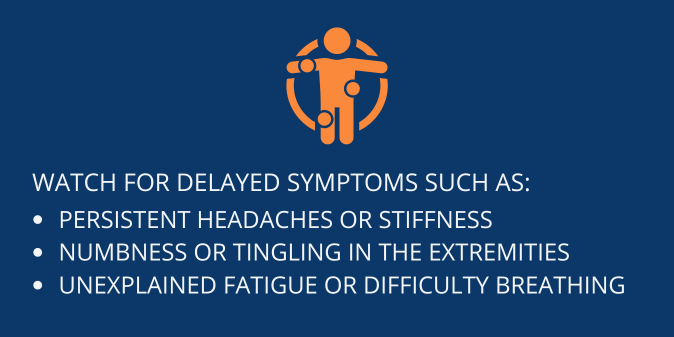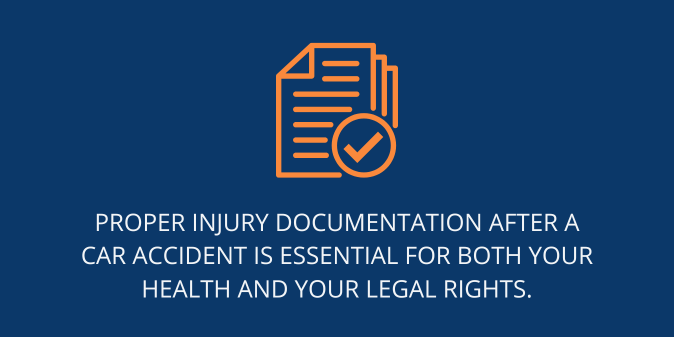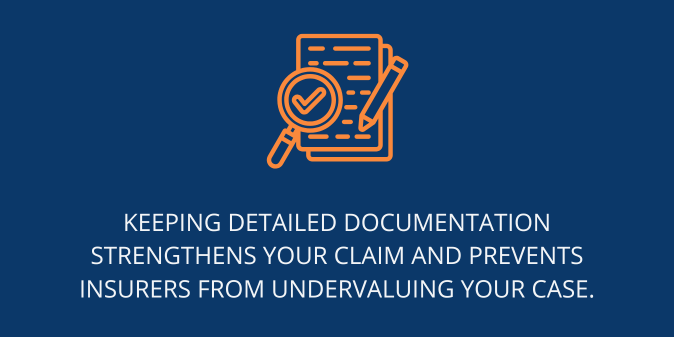Guide to Injury Assessment Post-Accident
If you’ve been in a car accident in Dunwoody, GA, you may feel fine at first—but injuries can take time to appear. At The Law Office of Nicholas P. Martin, we help accident victims understand their rights and recover the compensation they deserve. Knowing how to assess injuries after a crash is crucial for both your health and any potential legal claim.
How to Check for Injuries After an Accident
Your body’s natural response to an accident is to release adrenaline, which can mask pain and make injuries less obvious. Just because you don’t feel immediate pain doesn’t mean you’re uninjured. Take a few moments to check for injuries after an accident.
Start by checking for immediate signs of injury:
- Bleeding, swelling, or bruising: These can indicate cuts, fractures, or internal injuries.
- Dizziness, nausea, or confusion: Potential signs of a concussion or head trauma.
- Pain when moving your neck, back, or limbs: Could mean whiplash, fractures, or soft tissue damage.
Some injuries take hours or even days to appear.

Watch for delayed symptoms such as:
- Persistent headaches or stiffness: May signal whiplash or a concussion.
- Numbness or tingling in the extremities: Could point to nerve damage.
- Unexplained fatigue or difficulty breathing: Possible signs of internal injuries.
If you’re unsure whether you’re injured, err on the side of caution. A doctor can identify hidden injuries before they worsen. Keep track of any new symptoms in the hours or days after the accident—early treatment can prevent long-term complications.
Why Injury Documentation Matters
Proper injury documentation after a car accident is essential for both your health and your legal rights.Without medical records linking your injuries to the accident, insurance companies may try to deny your claim, arguing that your injuries were pre-existing or unrelated. A clear, detailed record of your injuries and treatment helps establish the severity of your condition and ensures you receive the compensation you deserve.

Beyond legal protection, documentation is critical for your recovery. Some injuries, like whiplash, concussions, or internal damage, don’t show symptoms immediately. A medical professional can identify potential complications early, preventing minor issues from becoming serious health concerns. Even if you feel fine, getting checked out and having your condition recorded ensures that if symptoms appear later, there is proof that they are connected to the accident.
Injury documentation also plays a key role in proving financial losses. Medical bills, physical therapy, prescriptions, and lost wages all add up. Without proper records, it can be difficult to recover these costs.
Keeping detailed documentation strengthens your claim and prevents insurers from undervaluing your case. Whether for medical treatment, financial reimbursement, or legal protection, injury documentation is a critical step you should never overlook.

Don’t Wait to Protect Your Rights
If you’ve been injured in an accident, don’t risk handling it alone. Contact an experienced car accident attorney in Dunwoody, GA.
The Law Office of Nicholas P. Martin is here to help you navigate the legal process and fight for the compensation you deserve. Call us right now to schedule your consultation.
- Holiday Road Safety: Tips to Keep You and Your Loved Ones Protected This Season- December 15, 2025
- What Happens If You’re Hit by a FedEx, UPS, or Amazon Delivery Truck?- November 12, 2025
- 3 Words Insurance Companies Hate to Hear: I Have Representation- October 15, 2025